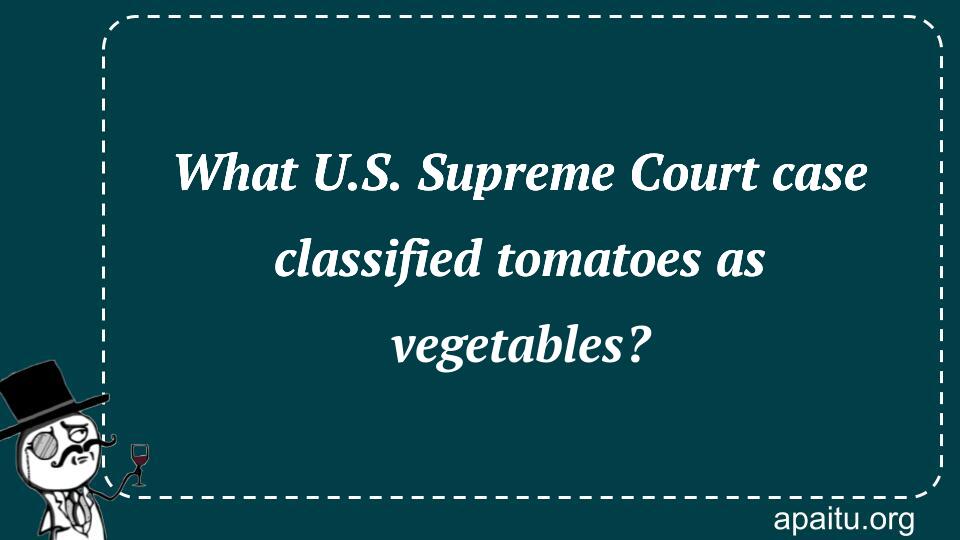Question
Here is the question : WHAT U.S. SUPREME COURT CASE CLASSIFIED TOMATOES AS VEGETABLES?
Option
Here is the option for the question :
- Gideon v. Wainwright
- Nix v. Hedden
- Miranda v. Arizona
- Marbury v. Madison
The Answer:
And, the answer for the the question is :
Explanation:
The United States Supreme Court made the decision in 1893 to place tomatoes in the category of vegetables rather than fruits. Since separate taxes were imposed on fruits and vegetables, the case was brought before the court because of concerns involving the importation of tomatoes. The rates were different from one another. Tomatoes are referred to as vegetables in “the common language of the people,” which Justice Horace Gray stated despite the fact that tomatoes are technically “fruit of a vine.”

In 1893, a U.S. Supreme Court case known as Nix v. Hedden classified tomatoes as vegetables rather than fruits. This decision had significant implications for the tomato industry and for the way we think about the classification of foods.
The case began when John Nix, a tomato importer, challenged a tariff on vegetables imposed by the Tariff Act of 1883. Nix argued that tomatoes should be classified as fruits, which were not subject to the tariff. However, Edward L. Hedden, the collector of customs for the Port of New York, argued that tomatoes were vegetables and should be subject to the tariff.
The Supreme Court ultimately sided with Hedden, ruling that tomatoes should be considered vegetables for the purposes of the tariff. The Court based its decision on the common understanding of tomatoes as vegetables in the United States at the time, as well as the way tomatoes are typically used in cooking.
While the decision had little immediate impact on the tomato industry, it did have broader implications for the classification of foods. In botany, a fruit is defined as the mature ovary of a flowering plant, typically containing seeds. By this definition, tomatoes are fruits, as are several other foods commonly thought of as vegetables, such as cucumbers and peppers.
However, in culinary terms, foods are often classified based on how they are used rather than their botanical classification. For example, tomatoes are typically used in savory dishes rather than desserts, which is why they are often thought of as vegetables rather than fruits.
The Nix v. Hedden decision highlights the tensions between scientific classification and cultural norms and practices. While botanists may classify tomatoes as fruits, the way we use and think about them in our everyday lives is what ultimately determines their classification as vegetables.
the Nix v. Hedden Supreme Court case classified tomatoes as vegetables rather than fruits for the purposes of a tariff. While this decision had little immediate impact on the tomato industry, it highlights the complex relationship between scientific classification and cultural norms and practices. Ultimately, the way we use and think about foods is what determines their classification in our culinary traditions.